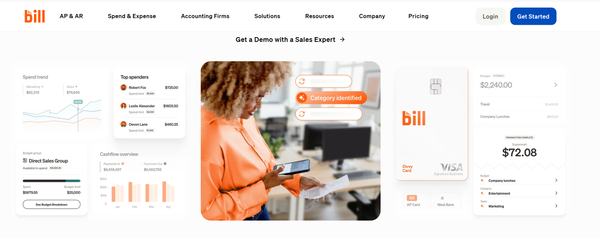How Lead Tracking Software Can Help in Improving Business Performance

What is Lead Tracking?
Lead tracking is the process of monitoring and managing leads, or potential customers, in a systematic and organized manner. The goal of lead tracking is to understand the status and progress of each lead and to help businesses prioritize their sales efforts and increase the likelihood of converting leads into paying customers.
Lead tracking typically involves capturing lead information from various sources, such as web forms, social media, and email campaigns. This information is then stored in a centralized database, where it can be accessed, analyzed, and updated by sales teams.
Lead tracking can also include activities such as lead nurturing (e.g., sending automated emails and follow-up messages), lead scoring (e.g., assigning a score to each lead based on their level of engagement), and pipeline management (e.g., monitoring the progress of leads through the sales process).
Lead tracking is usually facilitated by lead tracking software, which provides a centralized platform for businesses to manage their leads and sales processes. Lead tracking software can improve efficiency, reduce manual data entry and errors, and provide valuable insights into the performance of the sales team and overall business.
It can also help businesses prioritize their sales efforts, build better relationships with leads, and ultimately increase their chances of converting leads into paying customers.
Lead in Affiliate Marketing
In affiliate marketing, a lead refers to a potential customer who has shown interest in a product or service offered by an affiliate merchant. An affiliate marketer generates leads by promoting the affiliate merchant's products or services to potential customers through various marketing channels, such as their website, social media, email campaigns, or online advertisements.
When a potential customer clicks on an affiliate marketer's affiliate link, they are taken to the merchant's website, where they can learn more about the product or service and potentially make a purchase. If the potential customer makes a purchase, the affiliate marketer earns a commission from the merchant.
In affiliate marketing, lead generation and lead tracking are important aspects of the affiliate marketing process. Affiliate marketers need to continuously generate leads and monitor the performance of their marketing efforts to ensure that they are getting the best results.
Lead tracking software can help affiliate marketers track and manage their leads, understand the performance of their marketing efforts, and make data-driven decisions to improve their results.
Lead tracking can also help affiliate marketers optimize their marketing campaigns by identifying which channels and marketing strategies are generating the most leads and which ones need improvement.
This information can help affiliate marketers make informed decisions about how to allocate their marketing budget, what products or services to promote, and which channels to focus on to maximize their earnings.
8 Sources of Capturing Lead
There are many sources for capturing leads, and the most effective sources for a business can depend on the industry, target audience, and marketing strategies. Here are some common sources for capturing leads:
- Website forms: A business can place forms on its website, such as a contact form, newsletter sign-up form, or demo request form, to collect information from visitors who are interested in their products or services.
- Landing pages: A business can create targeted landing pages specifically designed to convert visitors into leads. Landing pages typically have a clear call-to-action (e.g., "Sign up for a free trial" or "Get a quote now"), and are optimized to collect information from visitors.
- Social media: Social media platforms like Facebook, LinkedIn, and Twitter can be used to engage with potential customers and collect information from those who are interested in the business.
- Email campaigns: Businesses can use email campaigns to reach out to their existing customers and prospects, and encourage them to provide their information in exchange for something valuable, such as a whitepaper, webinar, or discount.
- Online advertisements: Online advertisements, such as Google Ads and Facebook Ads, can be used to target specific audience segments and generate leads through clicks to landing pages or website forms.
- Events and trade shows: Businesses can participate in events and trade shows to meet potential customers face-to-face and collect their information.
- Referrals: Word-of-mouth referrals from satisfied customers can be a valuable source of leads. Businesses can encourage customers to refer their friends and family by offering incentives, such as discounts or free trials.
- Third-party data providers: Businesses can purchase lead lists from third-party data providers, although these leads may be less targeted and less engaged than leads generated from other sources.
More also, there are many sources for capturing leads, and the best sources for a business will depend on their industry, target audience, and marketing strategies. Lead tracking software can help businesses capture leads from all of these sources, store the information in a centralized database, and use the information to prioritize and manage their sales efforts.
Lead Tracking Platform
Lead tracking platforms play a vital role in affiliate marketing by providing businesses and affiliates with the tools and insights they need to manage and monitor the performance of their lead-generation efforts at a nominal cost. These platforms help businesses and affiliates streamline their processes, increase their efficiency, and improve their results by providing real-time data and analytics on the performance of their campaigns.
These platforms provide user-friendly dashboards, with in-depth track the activity of the visitors. It provides real-time statistics on user behaviour across a variety of multi-channel sources and much more.
These reports enable you to know how well your campaigns and promotions are actually performing by combing through to eliminate what’s not performing, or saving time on automated reporting to focus on finding optimization opportunities to accelerate revenue growth.
Get Started with Bloomclicks.com
Out of the other platforms, Bloomclicks.com platform is one of the fast-growing lead-tracking software that utilizes robust technology and provides accurate data on the user's activities on the web.
9 Crucial Roles of Lead Tracking Platforms in Affiliate Marketing:
- Lead tracking and management: Lead tracking platforms to help businesses and affiliates track and manage leads generated from their affiliate marketing campaigns. This includes capturing lead information, storing it in a centralized database, and updating lead information as the lead moves through the sales process. Lead tracking platforms also provide businesses and affiliates with a clear view of the sales pipeline, helping them understand the progress of each lead and make informed decisions about how to allocate their resources.
- Affiliate management: Lead tracking platforms to provide businesses with the tools they need to manage their affiliates, including real-time tracking and reporting on the performance of each affiliate. This includes information on the number of leads generated, the conversion rates of leads, and the commissions earned by each affiliate. Lead tracking platforms also help businesses and affiliates build strong relationships by providing an efficient and transparent commission tracking system, helping to ensure that affiliates are paid accurately and on time.
- Fraud detection: Lead tracking platforms help businesses and affiliates detect and prevent fraud by tracking and analyzing lead data for suspicious behaviour. This helps businesses ensure that their affiliate marketing campaigns are running effectively and that they are only paying commissions for legitimate leads and sales. Lead tracking platforms can also provide businesses with real-time alerts and notifications, helping them quickly identify and address any fraudulent activity.
- Campaign management: Lead tracking platforms to provide businesses with the tools they need to effectively manage their affiliate marketing campaigns, including real-time data and analytics on the performance of their campaigns. This includes information on the sources of leads, the conversion rates of leads, and the ROI of their campaigns. This helps businesses make informed decisions about which campaigns are working, which need to be improved, and which should be discontinued. Lead tracking platforms also provide businesses with the ability to easily create and manage new campaigns, helping them quickly respond to changing market conditions and capitalize on new opportunities.
- Commission tracking: Lead tracking platforms help businesses and affiliates accurately track and manage commissions, ensuring that affiliates are paid accurately and on time. This helps build trust and long-term relationships between businesses and affiliates and ensures that affiliates are motivated to continue promoting the business. Lead tracking platforms also provide businesses with real-time data and analytics on commission payments, helping them understand the financial performance of their affiliate marketing programs and make informed decisions about how to allocate their resources.
- Performance optimization: Lead tracking platforms to provide businesses and affiliates with real-time data and analytics on the performance of their campaigns, helping them understand what is working and what is not. This information can be used to optimize their lead generation efforts, including identifying the most effective sources of leads, optimizing their messaging and content, and fine-tuning their campaigns for maximum results. Lead tracking platforms also provide businesses and affiliates with the ability to track the progress of each lead, helping them understand their buying behaviour and make informed decisions about how to engage and convert them.
- Sales pipeline management: Lead tracking software provides visibility into the sales pipeline, allowing businesses to monitor the progress of leads through the sales process and make data-driven decisions to improve their sales performance. This helps businesses understand their sales performance, identify areas for improvement, and make informed decisions about how to allocate their sales resources.
- Analytics and reporting: Lead tracking software provides valuable insights into the performance of the sales ecosystem and overall business, through real-time analytics and reporting. This helps businesses understand their sales performance, identify trends and patterns, and make data-driven decisions to improve their results
- Lead distribution: Lead tracking platforms help businesses distribute leads to their affiliates in real time, allowing affiliates to quickly follow up with potential customers and increase their chances of converting them into paying customers. Lead tracking platforms can also help businesses optimize their lead distribution strategies, including setting up rules and conditions for lead distribution, such as geography, product interest, or buying behaviour.
In conclusion, lead tracking platforms play a crucial role in affiliate marketing by helping businesses and affiliates effectively manage and monitor the performance of their lead generation efforts. Lead tracking platforms provide valuable data and analytics to help businesses and affiliates optimize their results, ensure accurate commission tracking and build strong relationships with their affiliates. By using a lead tracking platform, businesses and affiliates can streamline their lead generation processes, increase their efficiency, and improve their results.





